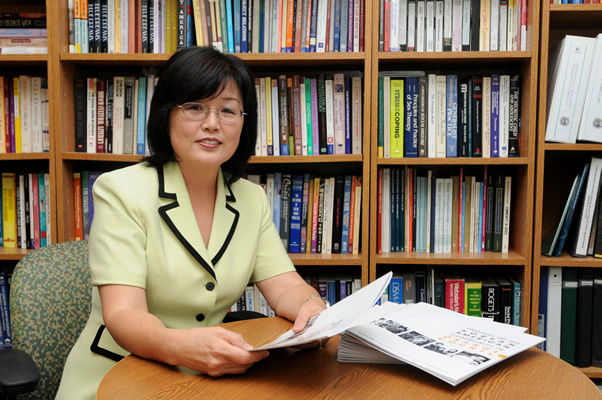On the Contrary
Study Finds Paradoxes in Orange County's Korean American Community
May 12, 2009
By Mimi Ko Cruz
With a population hitting nearly 90,000, the Korean American community is the fastest growing ethnic group in Orange County.
Professor Studies Social Work Issues in Korea
Mikyong Kim-Goh, professor of social work, is in Seoul, South Korea, on a fellowship, conducting field research.
Sponsored by the Korea Foundation, Kim-Goh is focusing on gathering information from female victims of domestic violence. She departed May 9 and will return in three months.
“I’m interviewing victims of domestic violence in Korea and when I return, I’ll interview Korean American victims,” Kim-Goh said. “I’d like to hear their voices, give them a chance to tell their stories. I want to find out how they respond to domestic violence, how they cope, what barriers and consequences they face and what social networks they have.”
In June, she is scheduled to make presentations at Kangnam University and Ehwa University and at a Korean social workers conference.
“Despite the growth, people don’t know much about the community,” said Mikyong Kim-Goh, Cal State Fullerton professor of social work, who recently completed a study on Korean Americans in Orange County. “The sense is that Korean Americans are OK, their kids are doing well in school, they own businesses that keep them financially secure and they’re the model minority.”
Not the case, according to Kim-Goh’s study.
While the Korean American community in the county has “extremely high rates of education and an admirable work ethic that results in many Korean-owned small businesses,” she said, “there are paradoxes within this population, notably the lack of English proficiency and high rates of poverty.”
Findings
Sponsored and produced by Cal State Fullerton, Children and Families Commission of Orange County and Korean Community Services, Kim-Goh’s study found:
The poverty rate of Korean families is greater than the county average, 10.6 percent vs. 6.6 percent respectively. The poverty rate of single Korean mothers of children under 18 is more than double the county average.
More than a quarter of all Korean families with children under 5 are receiving some form of government assistance.
A third of the county’s Korean population has no health insurance.
The median age of death for Koreans is 78.5 — 2.5 years younger than the county average.
Koreans suffer higher rates of chronic disease over others in the county: 30.2 percent have been diagnosed with high blood cholesterol (the county average is 21.7 percent); 3.2 percent have suffered a stroke (the county average is 1.9 percent); 11.5 percent have asthma (the county average is 6.2 percent).
Korean males have five times the rate of incidence and mortality rates of stomach cancer of the average rate among all men in California.
In 2005, 11.6 percent of Koreans in Orange County were determined to have likely psychological distress, quadruple the rate of all county residents, yet 1.7 percent of Koreans (compared to 7.2 percent of all county residents) sought professional help for mental or emotional problems.
In California, Koreans have the highest reported alcohol consumption in men (63 percent) and women (50.7 percent) among all Asian ethnic groups.
In Orange County, 13.2 percent of all residents smoke. The percentage of Koreans who smoke is 22.7 percent.
Kim-Goh said more than 330 Koreans in the county participated in the survey. In addition, existing statistics and census data were analyzed and three focus groups — including community leaders, pastors, health-care professionals and social service agency representative — were interviewed.
As a result of the study’s findings, the report includes recommendations to address the needs of Orange Count Koreans.
Recommendations:
Direct resources to enroll children and seniors in low-cost and no-cost insurance programs.
Provide single mothers and their children with needed resources and supportive services.
Recruit Korean bilingual/bicultural outreach workers to provide health education with the aim of preventing disease and promoting health.
Focus efforts to provide health screenings to reduce the incidence of disease, such as cancer.
Provide families with parenting education.
Work with Korean churches to reach out to Korean residents throughout Orange County.
Concentrate smoking cessation efforts among Korean males.
Provide access to linguistically and culturally competent mental health services.
Identify and expand culturally relevant substance abuse treatment programs.
Encourage and promote greater political participation and civic engagement in the Korean community.
“This is the very first report of its kind,” Kim-Goh said. “It provides some sense of who we are as a community of Korean Americans in Orange County. More than a third of the community is linguistically isolated, and that contributes to the challenges they face. The lack of health insurance and preventive care is a big issue that needs to be addressed. They need access to resources.”
She said churches are influential in the Korean community because most Koreans are church-goers, so churches can help provide health education through partnerships with community groups.
“I’m hoping that through this report, policy-makers will pay attention to the needs of Korean Americans when making funding decisions,” Kim-Goh said.
Kim-Goh, who joined the university in 1992, has research interests in domestic violence, service-learning in higher education, mental health delivery in ethnic minority communities and immigrant and refugee issues. She recently worked on a $750,000 youth violence prevention project that was funded by the U.S. Department of Health and Human Services.
The educator has published numerous papers in scholarly journals, including the Community Mental Health Journal and American Journal of Orthopsychiatry. A licensed clinical social worker, Kim-Goh has served on the Orange County Mental Health Board. She earned her doctorate in social welfare from UC Berkeley.
Kim-Goh‘s 36-page report is available for download (PDF).


